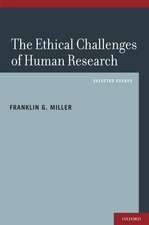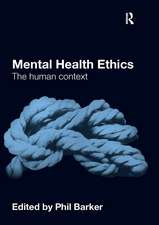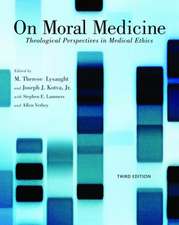The Ethics of Health Care Rationing: An Introduction
Autor Greg Bognar, Iwao Hiroseen Limba Engleză Paperback – 19 mai 2014
| Toate formatele și edițiile | Preț | Express |
|---|---|---|
| Paperback (2) | 286.86 lei 6-8 săpt. | |
| Routledge – 19 mai 2014 | 286.86 lei 6-8 săpt. | |
| Taylor & Francis – 17 mar 2022 | 356.88 lei 6-8 săpt. | |
| Hardback (1) | 999.02 lei 6-8 săpt. | |
| Taylor & Francis – 17 mar 2022 | 999.02 lei 6-8 săpt. |
Preț: 286.86 lei
Preț vechi: 301.96 lei
-5% Nou
Puncte Express: 430
Preț estimativ în valută:
54.90€ • 57.10$ • 46.01£
54.90€ • 57.10$ • 46.01£
Carte tipărită la comandă
Livrare economică 14-28 martie
Preluare comenzi: 021 569.72.76
Specificații
ISBN-13: 9780415521185
ISBN-10: 0415521181
Pagini: 170
Ilustrații: 4 black & white tables
Dimensiuni: 152 x 231 x 13 mm
Greutate: 0.27 kg
Editura: Routledge
ISBN-10: 0415521181
Pagini: 170
Ilustrații: 4 black & white tables
Dimensiuni: 152 x 231 x 13 mm
Greutate: 0.27 kg
Editura: Routledge
Notă biografică
Greg Bognar is Lecturer in Philosophy at the Department of Politics, Philosophy, and Legal Studies, La Trobe University, Australia. Iwao Hirose is Associate Professor at the Philosophy Department and the School of Environment, McGill University, Canada. He is the author of Egalitarianism (Routledge, 2014) and Moral Aggregation (2014), and a co-editor of The Oxford Handbook of Value Theory (2014) and Weighing and Reasoning (2014).
Cuprins
Introduction 1. Ethics and Health Care 2. The Value of Health 3. Ethics and Cost-Effectiveness 4. Problems of Discrimination 5. The Aggregation of Health Benefits 6. Responsibility for Health Conclusion. Index
Recenzii
Praise for the First Edition
'Most contemporary publications related to health care rationing are written for specialized, often academic, audiences, but this work is an introduction to the topic for general readers. It is accessible to those with no prior knowledge of philosophy, bioethics, or health policy. Suggested readings are available at the end of each chapter for both new and advanced readers to explore chapter topics in more depth. Summing Up: Recommended. All health sciences students, researchers/faculty, professionals/practitioners, and general readers.' - M. L. Charleroy, CHOICE
'Against the background of ineluctable scarcity in healthcare resources, this important, accessible and provocative book introduces readers to pressing issues concerning how, morally speaking, we ought to determine who gets what. If we want an informed public debate on healthcare rationing, I don’t know of a better place to start.' - Samuel Kerstein, University of Maryland, USA
'A great introduction to the field, combining philosophical sophistication with economic literacy to deliver profound insights into the resource allocation dilemmas facing health care decision makers. A valuable resource for students and health professionals alike.' - Richard Cookson, University of York, UK
'Bognar and Hirose illuminate and make accessible the most pressing and entrenched controversies in health care rationing. This book spans political philosophy, health economics and bioethics, grounding arguments in vividly described cases. It delivers complex ideas in a relaxed style perfectly suited to drawing us all in to a long overdue common inquiry.' - Monique Jonas, University of Auckland, New Zealand
'The Ethics of Health Care Rationing is…a ‘must read’ for students of bioethics and other interested parties, as it sheds a light on issues that we often tend to avoid or ignore in our field. Moreover, it is an agreeable read and the mix of real-life and fictional examples works particularly well.' - Kristien Hens, Ethical Perspectives
'Most contemporary publications related to health care rationing are written for specialized, often academic, audiences, but this work is an introduction to the topic for general readers. It is accessible to those with no prior knowledge of philosophy, bioethics, or health policy. Suggested readings are available at the end of each chapter for both new and advanced readers to explore chapter topics in more depth. Summing Up: Recommended. All health sciences students, researchers/faculty, professionals/practitioners, and general readers.' - M. L. Charleroy, CHOICE
'Against the background of ineluctable scarcity in healthcare resources, this important, accessible and provocative book introduces readers to pressing issues concerning how, morally speaking, we ought to determine who gets what. If we want an informed public debate on healthcare rationing, I don’t know of a better place to start.' - Samuel Kerstein, University of Maryland, USA
'A great introduction to the field, combining philosophical sophistication with economic literacy to deliver profound insights into the resource allocation dilemmas facing health care decision makers. A valuable resource for students and health professionals alike.' - Richard Cookson, University of York, UK
'Bognar and Hirose illuminate and make accessible the most pressing and entrenched controversies in health care rationing. This book spans political philosophy, health economics and bioethics, grounding arguments in vividly described cases. It delivers complex ideas in a relaxed style perfectly suited to drawing us all in to a long overdue common inquiry.' - Monique Jonas, University of Auckland, New Zealand
'The Ethics of Health Care Rationing is…a ‘must read’ for students of bioethics and other interested parties, as it sheds a light on issues that we often tend to avoid or ignore in our field. Moreover, it is an agreeable read and the mix of real-life and fictional examples works particularly well.' - Kristien Hens, Ethical Perspectives
Descriere
Descriere de la o altă ediție sau format:
Revised and updated throughout, this 2e includes new chapters on disability and age discrimination, and the price of theraputic drugs. An ideal starting point for students new to the subject, in philosophy and related fields such as politics, health economics, public health, medicine, nursing and social work.
Revised and updated throughout, this 2e includes new chapters on disability and age discrimination, and the price of theraputic drugs. An ideal starting point for students new to the subject, in philosophy and related fields such as politics, health economics, public health, medicine, nursing and social work.












